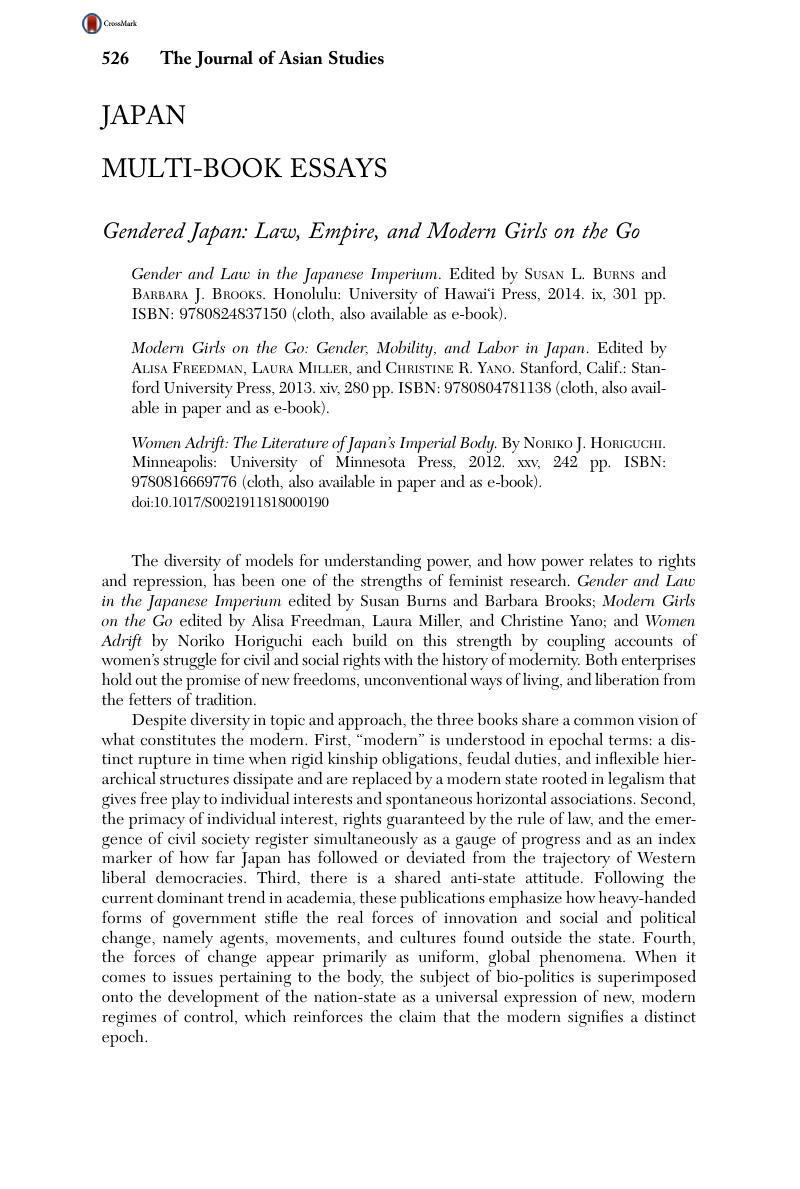No CrossRef data available.
Published online by Cambridge University Press: 11 May 2018

1 Botsman, Daniel V., “Freedom without Slavery? ‘Coolies,’ Prostitutes, and Outcastes in Meiji Japan's ‘Emancipation Moment,’” American Historical Review 116, no. 5 (2011): 1323–47CrossRefGoogle Scholar.
2 Ramseyer, J. Mark, “Indentured Prostitution in Imperial Japan: Credible Commitments in the Commercial Sex Industry,” Journal of Law, Economics, & Organization 7, no. 1 (1991): 89–116Google Scholar.
3 Tsunekatsu Kurimoto to Basom Johnson, “Observation of the Imperial Government of Japan on the Report Concerning Japan and the League of Nations Commission of Enquiry into the Traffic in Women and Children in the East,” November 15, 1932, S. Sawada to E. Ekstrand, 11B/39491/38154, League of Nations Archive, Geneva.
4 My thanks to Marie Seong-Hak Kim for highlighting this issue for me.
5 Yuki, Fujime, “Japanese Feminism and Commercialized Sex: The Union of Militarism and Prohibitionism,” Social Science Japan Journal 9, no. 2 (2006): 33–50Google Scholar; “The Prostitutes’ Union and the Impact of the 1956 Anti-Prostitution Law in Japan,” U.S.-Japan Women's Journal, English Supplement 5 (1993): 3–27Google Scholar; Sei no Rekishishigaku: Kōshō Seido Daitazai Taisei Kara Baishun Bōshihō Yūsei Hogohō E [The History of Sex: From the System of Legal Prostitution and Criminalized Abortion to the System of the Prevention of Prostitution Law and the Eugenics Protection Law] (Tokyo: Fuji Shuppan, 1997)Google Scholar.
6 Botsman, Daniel V., Punishment and Power in the Making of Modern Japan (Princeton, N.J.: Princeton University Press, 2005)Google Scholar.
7 Vice-foreign minister Yoshida Kyōnari to Inch'on consul Kobayashi Tanichi, Dispatch no. 59, September 4, 1883, Honpōjin Fuseigyō Torishimari Kankei Hōki Zassan, vol. 1, the Diplomatic Archives of the Ministry of Foreign Affairs of Japan.
8 Said, Edward W., Culture and Imperialism (London: Chatto and Windus, 1993), 3–6Google Scholar.
9 Silverberg, Miriam, “The Modern Girl as Militant,” in Recreating Japanese Women, 1600–1945, ed. Bernstein, Gail Lee (Berkeley: University of California Press, 1991), 239–66Google Scholar; “The Café Waitress Serving Modern Japan,” in Mirror of Modernity: Invented Traditions of Modern Japan, ed. Vlastos, Stephen (Berkeley: University of California Press, 1998), 208–25Google Scholar.
10 Silverberg, “The Modern Girl as Militant,” ibid., 240.
11 Harootunian, Harry, Overcome by Modernity: History, Culture, and Community in Interwar Japan (Princeton, N.J.: Princeton University Press, 2001), 1–31Google Scholar.
12 American neoliberal analysis crystalized around the theory of human capital advocated by University of Chicago economists Theodore Schultz and Gary Becker.
13 Schultz, Theodore W., “Investment in Man: An Economist's View,” Social Service Review 33, no. 2 (1959): 109–117CrossRefGoogle Scholar, 110.
14 Foucault, Michel, The Birth of Biopolitics: Lectures at the Collège de France, 1978–79, ed. Senellart, Michel, trans. Burchell, Graham (Basingstoke, UK: Palgrave Macmillan, 2008), 222CrossRefGoogle Scholar.
15 Becker, Gary S., “Prize Lecture: The Economic Way of Looking at Life,” in Nobel Lectures, Economics 1991–1995, ed. Persson, Torsten (Singapore: World Scientific Publishing), 43Google Scholar. http://www.nobelprize.org/nobel_prizes/economic-sciences/laureates/1992/becker-lecture.html (accessed August 26, 2015).
16 Dower, John, War without Mercy: Race and Power in the Pacific War (New York: Pantheon Books, 1986)Google Scholar.
17 Hotta, Eri, Pan-Asianism and Japan's War 1931–1945 (New York: Palgrave Macmillan, 2007)Google Scholar; Saaler, Sven and Szpilman, Christopher W. A., eds., Pan-Asianism: A Documentary History – Volume 1, 1850–1920 (Lanham, Md.: Rowman & Littlefield, 2011)Google Scholar.
18 Tomida, Hiroko, “The Controversy over the Protection of Motherhood and Its Impact upon the Japanese Women's Movement,” European Journal of East Asian Studies 3, no. 2 (2004): 243–71CrossRefGoogle Scholar.
19 Sievers, Sharon L., Flowers in Salt: The Beginnings of Feminist Consciousness in Modern Japan (Stanford, Calif.: Stanford University Press, 1983)Google Scholar.